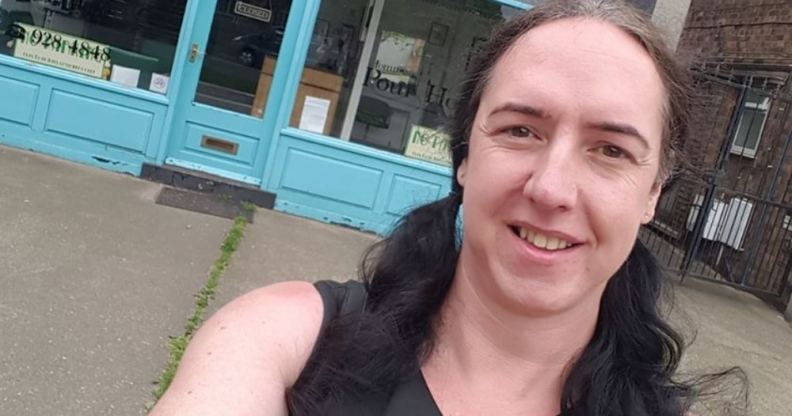Yes, trans women can get prostate cancer too – but they’re being failed by the healthcare system

Heather Peto. (Provided)
Heather Peto had been feeling run down for a while before she realised there might be something wrong.
At first, she blamed her recent experience with COVID for her feelings of exhaustion – but gradually, she started to notice other, more troubling symptoms creeping in. Eventually, she realised that she was exhibiting some of the signs and symptoms of prostate cancer.
Getting to that realisation wasn’t easy. As a trans woman, Heather often has to fight to access the healthcare she needs. Some doctors and specialists are unaware of the specific symptoms trans women might experience when they have prostate cancer, while others don’t even know trans women can get prostate cancer.
Right now, Heather is undergoing tests to determine what’s causing her prostate issues. In the mean time, she wants to speak out about the symptoms she is experiencing so others will know what they need to watch out for.
Aside from the exhaustion, the first thing Heather noticed was that she started to experience urinary incontinence during sex.
“It was only a small amount, but that had never happened before,” Heather tells PinkNews. “It then started to happen regularly… One of the key things to get across is that if you’re noticed a change in your urinary habits, whether that’s incontinence or other things, then it’s important to get it checked out.”
Increasingly worried about her symptoms, Heather went to her GP for blood tests.
“The blood test measures something called prostate-specific antigen (PSA), and if you’ve got higher levels of that it tends to mean there’s something wrong with the prostate – it could be cancer, could be prostatitis,” Heather explains. Prostatitis refers to the inflammation of the prostate gland.

Heather Peto pictured with Keir Starmer. (Provided)
“Mine was quite high for my age,” Heather says. The tests were evidence enough that something was wrong, but that’s where Heather’s issues with the healthcare system begin. As a trans woman who has had hormone treatment, she should in general have lower PSA levels than a cis man would have.
The result is that some trans women and non-binary people with prostates can show lower levels of PSA in blood tests, but they could still have prostate cancer. According to Prostate Cancer UK, some experts believe a PSA level above 1 ng/ml in a trans woman should warrant further investigation.
Trans women can experience different symptoms of prostate cancer
Another barrier to treatment and diagnosis for trans women is that the symptoms can be different. One of the symptoms most commonly associated with prostate cancer is the need to get up and urinate frequently during the night – but that’s largely based on the experiences of cis men. Heather noticed some different symptoms.
“One of those symptoms is that there’s a form of incontinence by which you go to the toilet for a wee but you don’t expel all your wee… so you have that little residual amount that you can’t seem to expel. You know it’s there but it’s not completely gone. When it discharges, which it does, it ends up leaking all at once.”
Something else Heather experienced is that she would orgasm spontaneously during urination. “It’s very awkward,” she says. Unfortunately, Heather experienced some “disinterest” from medical professionals when she raised concerns about the symptoms she was experiencing – although she stresses that the care she has received has generally been good.
I’m left in this never-never of not knowing if it’s cancer that’s getting worse or if there’s another, more benign explanation such as prostatitis.
After noticing those symptoms, Heather went to her GP and was referred to a specialist. She was supposed to have a urine test in November 2021, but it was subsequently pushed back several times.
“I’m left in this never-never of not knowing if it’s cancer that’s getting worse or if there’s another, more benign explanation such as prostatitis, or if it could be another form of cancer that’s affecting the area. My health is getting worse, I’m OK but not OK in terms of living a normal live. So that’s my experience.”
Heather is speaking out about her experience because she wants both the medical field and the wider public to have greater awareness about the fact that trans and non-binary people with prostates are susceptible to developing prostate cancer too.

Heather Peto pictured on the left. (Provided)
“There is this list on the NHS website of symptoms that you might experience with prostate cancer, but it does seem to me to neglect certain things trans and non-binary people with prostates might experience, and it possibly neglects people who have sex with men.
“There needs to be more research and more guidance around trans people with prostate cancer,” Heather says. “I don’t want to be too alarmist, but I think we need to communicate this – there are people who are needlessly being treated further along in their prostate cancer than is necessary.”
Heather says there’s a level of ignorance in the medical field about the reality of prostate cancer for trans people. That’s not necessarily anybody’s fault, she points out – but she would like to see better education and training for GPs and other medical professionals. Right now, trans and non-binary people with prostates often have to educate healthcare professionals themselves.
“People need to talk more broadly about the problems trans people have,” she says. “We need to make sure GPs know about it, but also patients know about it so they can go to their GP in the first place… Your life is in their hands.”
Heather still doesn’t know what her symptoms mean, but she’s trying to remain optimistic while she waits on a firm answer.
“There’s always that nagging feeling in the back of my mind that it’s something worse that’s not being tackled, that I’ll end up dying from it, or that I’ll end up being more seriously ill than I need to be.”
What’s worse is that Heather knows she will likely experience transphobic abuse online because she’s daring to speak out about her experience. She has received brutal, cruel messages on social media over the years – all because she’s a trans woman. Some of those have wished cancer on her.
This culture of abuse only further silences trans people and makes them less likely to seek the support they need.
There needs to be greater awareness in the medical field about trans women’s medical needs
Heather’s experience is echoed by Suzanna Hopwood, also a trans woman. She developed prostatitis a number of years ago – she went to her GP and was referred to a consultant. The care she received was excellent.
“They don’t want to do any surgery on me, they’re just treating it with drugs. They didn’t think there was anything sinister lurking in my prostate and it wasn’t hugely big. That’s the process that I went through and I came out the other side reasonably satisfied,” Suzanna says.
“On the other side, you can fall into a bit of a hole really and not get properly diagnosed.”

Heather Peto. (Provided)
That’s why Suzanna worked with Prostate Cancer UK to help help bring its information on prostate cancer in trans and non-binary people up to date. She reached out to the charity when she started having issues with prostatitis and learned that the charity was already working on updating its information to make it more inclusive.
Today, Prostate Cancer UK provides in-depth information about the realities facing trans women and non-binary people with prostates. Worryingly, the charity points out that many people don’t even know that trans women and some non-binary people have prostates, meaning they’re less likely to seek and access the right supports.
For Heather and Suzanna, the path forward is education – both for medical professionals and for trans and non-binary people. Without that, lives could continue to be needlessly lost.
If you’re trans or non-binary and are worried about prostate cancer or prostatitis, you can visit the Prostate Cancer UK website to find out more.

